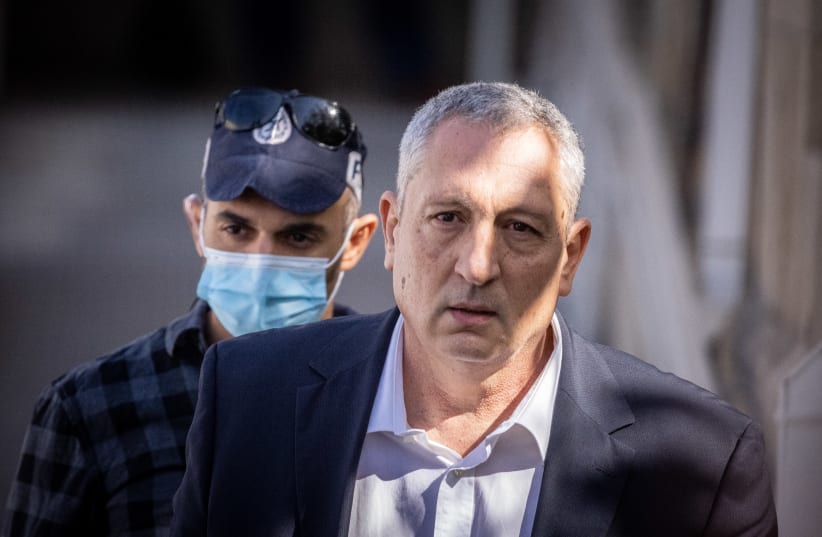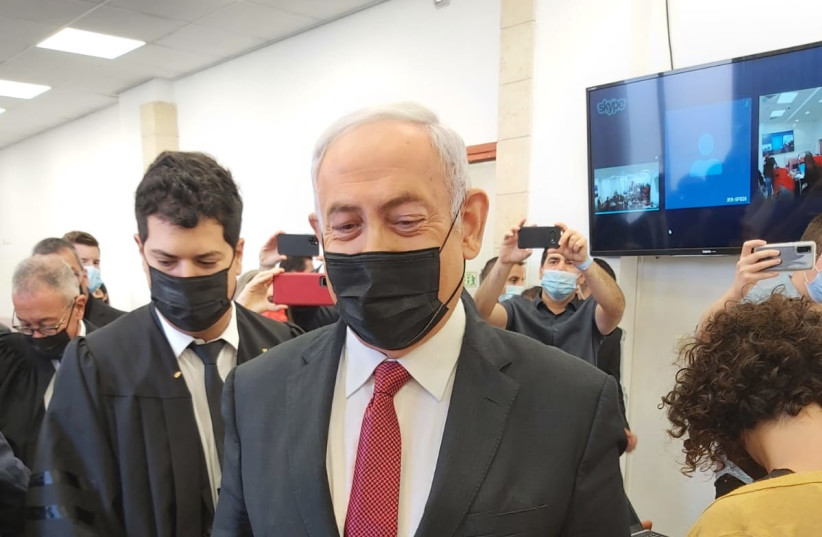Star witness Nir Hefetz said the police interrogation of him was “draconian,” “horrific” and “monstrous,” as former prime minister Benjamin Netanyahu cross-examined him on Tuesday.
Defense lawyer Boaz Ben Tzur was trying to emphasize the treatment of Hefetz as part of his strategy to undermine his testimony against Netanyahu as coerced and manufactured to escape alleged abuse by law enforcement.
Though Hefetz has been providing the prosecution with extremely damaging testimony against Netanyahu over five hearings, he is clearly still furious at how he was treated, and was more than ready to give the defense what it wanted about how he was treated.
For example, he testified, “I understood from the start that the police were threatening... to expose aspects of my private life” that were unrelated to the Netanyahu case, as a bargaining trip to pressure him into turning on the former prime minister.
In order to make the visual point before the Jerusalem District Court, Ben Tzur showed several stunning video recordings of Hefetz while he was being interrogated by police in 2018.
In contrast to the smooth, crisp and combative presence Hefetz was portraying in court on Tuesday, the videos depicted a downtrodden man who was slumping in his seat with his arms crossed and his face drawn inward.
His answers to police interrogators alternated from short and showing an internal struggle, to showing dismay and disbelief at his predicament.
Despite Hefetz providing the defense with ammunition against the police, he said during his testimony for the prosecution that all of his treatment was not his primary motivation for turning on Netanyahu, and that his stance as a state witness was letting him tell the truth.
Earlier on Tuesday afternoon, the court rejected the state prosecution’s request to throw out the media for portions of Hefetz’s cross-examination.
The court threatened that it still might conduct a more targeted closed-door session in the future. In response, the prosecution asked for another recess to consult about the consequences of the ruling.
Responding to the prosecution’s request before the court ruled, the defense furiously accused the prosecution of trying to cover-up its alleged abuse of Hefetz – which he himself called “monstrous” – as it tried to flip him to testify against his former boss.
Furthermore, the defense said it was hypocritical for “the crown” – referring to the prosecution – which supervised the police’s alleged abuse of Hefetz to ask to cover-up law enforcement actions based on Hefetz’s privacy, when they themselves brutally violated his privacy.
Members of the media also united to oppose the prosecution’s motion, emphasizing the importance of freedom of speech and freedom of the press in a case of momentous and historic importance.
Both the defense and the media noted that there was already a gag order in place, and that closing proceedings to the media was a vast overreaction.
In contrast, Hefetz emotionally and angrily condemned portions of the press and social media factions for already violating the gag order, and being ready to do it again if given the chance.
Prior to that exchange, the prosecution on Tuesday morning finished Hefetz’s direct testimony against Netanyahu in Case 2000, the Israel Hayom-Yediot Aharonot Affair, following four days of testimony mostly relating to Case 4000, the Bezeq-Walla Affair.
Hefetz talked about Netanyahu’s obsession with alternately fighting or trying to seek peace with Yediot Aharonot owner Arnon Nuni Mozes.
He said that only major national security events such as the 2010 Mavi Marmara flotilla could capture as much of Netanyahu’s attention as his constant focus on Mozes, Yediot and their coverage of his family.
Hefetz also noted that tycoon and Netanyahu ally Arnon Milchin (also a witness in Case 1000, the Illegal Gifts Affair) told him about a warning he gave to Israel Hayom owner Sheldon Adelson, that if they fell into Netanyahu’s attempts to coordinate circulation and coverage between Adelson and Mozes, they would all end up in a jail cell next to Netanyahu.
In addition, Hefetz said that Sara Netanyahu’s influence on a mix of policy and public relations decisions was paramount.
Regarding Mozes, Hefetz said that Sara sometimes took an even more aggressive posture than the former prime minister, but that Hefetz tried to advise Netanyahu to stay within certain limits and to put broader electoral concerns above his feud with Mozes.
Hefetz gave significant credit to Anglo-Israeli campaign manager Aron Shaviv for also keeping Netanyahu focused on smarter strategies, saying he “could not exaggerate his importance” leading into the 2015 election.

